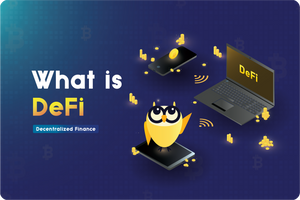In the world🌐 of blockchain, NFTs and FinTech, the term “DeFi” gets thrown around a lot. You might have heard someone talking about it 🗣️ or read about the term online.💻
👀 In this article, we’ll define what DeFi is, describe how it works, provide some examples and a few pros and cons, and offer an explanation as to why DeFi may just be the future of the financial system as we know it.
👉 DEFI DEFINED
🔎 So what exactly is DeFi? DeFi, or decentralized finance, is a collective term for emerging, peer-to-peer financial technology based on secure distributed ledgers similar to those used by cryptocurrencies.
Unlike centralized finance (CeFi) / traditional finance, DeFi is not built on or around a central figure or institution. Instead, it is powered by a number of distributed actors and organizations often working independently or in tandem.
DeFi was created as an alternative to traditional financial services to remove third parties and centralized institutions from financial transactions. The components that make up DeFi include stablecoin, software and hardware that enables the development of applications.
📝 CEFI vs DEFI
DeFi’s potential becomes clear when you look at problems that exist today.
⚠️ Some people have a lack of access to set up a bank account or use financial services, making them unemployable and unable to get paid. Furthermore, processing times for money transfers can take days and trading hours limited to the business hours of a specific timezone. Also, governments and centralized institutions can close down markets at will.
Here is a comparison table showing how traditional finance and DeFi compare.
❓ WHY IS DEFI IMPORTANT?
✨ DeFi takes the basic premise of Bitcoin — digital money, and expands on it, creating an entire digital alternative without all the associated costs. The potential? More open, free, and trustless financial markets that are accessible to anyone with an internet connection.
❓ HOW DOES DEFI WORK?
Using the same blockchain technology that cryptocurrencies use, DeFi’s apps and smart contracts are designed to take the place of CeFi. These decentralized apps, or dApps, operate in the same way blockchain transactions are recorded. They are basically codes of instruction that run when certain conditions have been met. These are built on layered platforms such as Ethereum.
DeFi is made up of decentralized exchanges, or DEXs, aggregators and wallets, decentralized marketplaces, oracle / prediction markets and the Layer 1 blockchain that developers build on.
📈 DEFI USES
DeFi has many practical uses for peer-to-peer (P2P) financial transactions:
Send or stream money around the globe;🌐
Access stable currencies;💵
Borrow funds with or without collateral;💫
Grow your portfolio and start crypto savings;
Trade tokens;💻
Fund your ideas;💡
Buy insurance;💲
Manage your portfolio.📊
✔️❌ DEFI PROS & CONS
PROS
✔️DeFi users have full control over their finances.
✔️DeFi dApps allow individuals to transfer capital around the world.
✔️Higher interest can be earned through staking instead of high interest bank savings accounts.
✔️Greater ability to generate income.
✔️High level of security.
CONS
❌Lacks the consumer protections of the traditional system.
❌Current absence of significant regulation resulting in higher risk of fraud or scams.
❌Smart contracts can be prone to bugs or a wild algorithm if designed poorly.
❌Participation in DeFi can be complex and not easily understood.
❌High level of volatility.
🌎 THE FUTURE OF DEFI
While DeFi is yet to reach wide-scale adoption, it will become more feasible when blockchains become scalable.
In terms of adoption, it is uncertain how exactly things will pan out in the future. One potential outcome might include traditional finance adopting aspects of DeFi while retaining elements of centralization rather than DeFi completely replacing mainstream financial options. Any entirely decentralized solutions, however, may continue to operate outside of mainstream finance.
Essentially, the attraction of DeFi is its benefit of offering many of the services of the mainstream financial world in a fashion controlled by the masses instead of a central entity or entities.
The information provided on this website does not constitute investment advice, financial advice, trading advice, or any other sort of advice and you should not treat any of the website's content as such. Bloom does not recommend that any cryptocurrency or NFTs should be bought, sold, or held by you. Do conduct your own due diligence and consult your financial advisor before making any investment decisions.
